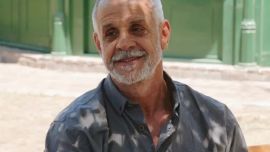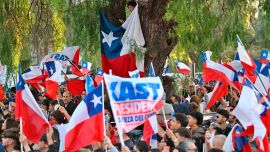More than 3,000 coronavirus cases were reported on Wednesday in Argentina, on the eve of Independence Day. The steady increase in infections and growing number of daily deaths, mainly in the metropolitan area (Buenos Aires City plus Greater Buenos Aires) should have a sobering effect on the nation's politicos who are prone to brawling. But the arguing will never go away. At times it pauses briefly when the public is hit by unsettling news on the coronavirus front, but then, in no time at all, the bickering begins once more. Even 9 de Julio can’t stop it – the opposition staged an anti-government protest on Thursday.
The strict lockdown in Buenos Aires Metropolitan Area (AMBA) is technically scheduled to end on July 17. The question is if Buenos Aires City (a centre-right bastion) and Buenos Aires province (run by a Kirchnerite governor) will enter different phases of the quarantine after that date. There is rife speculation that Buenos Aires City Mayor Horacio Rodriguez Larreta will ease the restrictions regardless of what the neighbouring province decides to do. More cases are now reported in Buenos Aires Province than in the capital, forcing the provincial authorities to underline the problems it is facing given that Greater Buenos Aires has a much bigger population. The tussling will continue until the deadline. Some reports are suggesting that the metropolitan area’s leaders have agreed not to live under different phases of the lockdown phases after July 17. President Alberto Fernández, speaking with governors on Thursday, called City Mayor Horacio Rodríguez Larreta “a friend."
So what exactly is the arguing about when it flares up? Take your pick.
A judge is investigating allegations that the AFI state intelligence agency spied on politicians, journalists and trade union leaders during the Mauricio Macri administration. The centre-right president’s two former state intelligence chiefs (Gustavo Arribas and Silvia Majdalani) are expected to be summoned for questioning in court. The case is complex because allegations have surfaced alleging that at least one journalist known for investigating Kirchnerite leaders had secret service agents working for his television show production team while Macri was president. The uproar has prompted a debate about the use of sources by journalists and the extent of ties with state agents. Prominent journalists said in a public statement they feared that the allegations would be used as an excuse to jail colleagues who are critical of President Alberto Fernández’s Peronist government. Despite the loud arguments – and a new judge in charge – the investigation into illegal snooping during Marci’s presidency will continue.
Not interested in a spy case? Here's something else to argue about, according to your political allegiance: Fabián Gutiérrez, a former private secretary to current Vice-President Cristina Fernández de Kirchner when she was head of state, was found dead last Saturday in El Calafate in Santa Cruz Province. Local investigators in the Kirchner family's home province in Patagonia believe Gutiérrez was killed by four young men and that the former secretary was romantically involved with one of them. But Macri's coalition, Juntos por el Cambio (made up of the former president’s PRO party, the Unión Cívica Radical and the Coalición Cívica ARI) released a statement saying that Gutiérrez's brutal killing carried serious institutional consequences and that the case should be handled by federal investigators in Buenos Aires. The opposition said it had no evidence that the killing was political, but said that relatives of the former president should not be involved in the inquiry (the prosecutor probing the private secretary's gory killing is Fernández de Kirchner's niece and the daughter of Santa Cruz Governor Alicia Kirchner). Gutiérrez had recently testified as a state witness in a sweeping corruption case against Fernández de Kirchner, but the local judge says that so far there was no indication that the killing was politically motivated.
The opposition statement, the work of Macri's former security minister Patricia Bullrich, disgusted the president and his inner circle. Cabinet Chief Santiago Cafiero called it a “repulsive” bid to gain politically from a killing. Then Fernández himself called the statement a “rogue” act. It's not even clear if the statement had the backing of all the prominent centre-right opposition leaders, especially those in office who have to deal with ruling party officials on a daily basis during the coronavirus crisis. Fernández made a point of meeting on visibly amiable terms with Vicente López Mayor Jorge Macri (Macri's cousin) and another centre-right mayor, sending out the message that they did not agree with the terms of the statement and that it was business as usual.
There now appears to be a consolidated moderate wing in Juntos por el Cambio, which includes Rodríguez Larreta and most of the centre-right mayors in Buenos Aires Province, that is not willing to take its orders from Macri and Bullrich. The challenge for the centre-right coalition is to avoid a formal splinter ahead of the midterm elections next year, which would weaken their standing. Macri, who has remained silent in recent months, made a rare appearance on Wednesday in an online interview. He insisted that his role is to keep an eye on the Peronist administration, implying that it was overrunning civil liberties and attacking private property, using the lockdown as an excuse.
Is the business community also splintering? A group of top business leaders met recently with ruling coalition lawmaker Máximo Kirchner (the vice-president's son) and Lower House Speaker Sergio Massa, presumably to discuss pressing issues like the renegotiation with bondholders of US$65 billion worth of foreign debt and the delayed plan to nationalise the debt-saddled soy crusher Vicentin. If the divide in the opposition and business circles grows, split between those who favour all-out confrontation and those who don't, then Fernández could have a chance of pushing beyond the polarisation that has dominated Argentine politics since the rise of Kirchnerismo in 2003.
Success for Fernández will hinge on his popularity holding up ahead of next year's election. The president's popularity is dropping, but polls show it is still high. Yet Argentina is historically volatile and ripe for agitation. A lot still depends on the debt negotiations. Economy Minister Martín Guzmán has now unveiled an improved offer that bondholders will have to accept or reject by early next month. The problem is that the two major groups of bondholders called the sweetened offer only a step in the right direction, refusing to accept it even when it appears reasonable to most of the international community.
The nightmare scenario for Fernández is default, economic misery after the lockdown and a sudden drop in his popularity – that could lead to the opposition closing ranks behind the belligerent wing headed by Macri and Bullrich ahead of the 2021 elections.























Comments